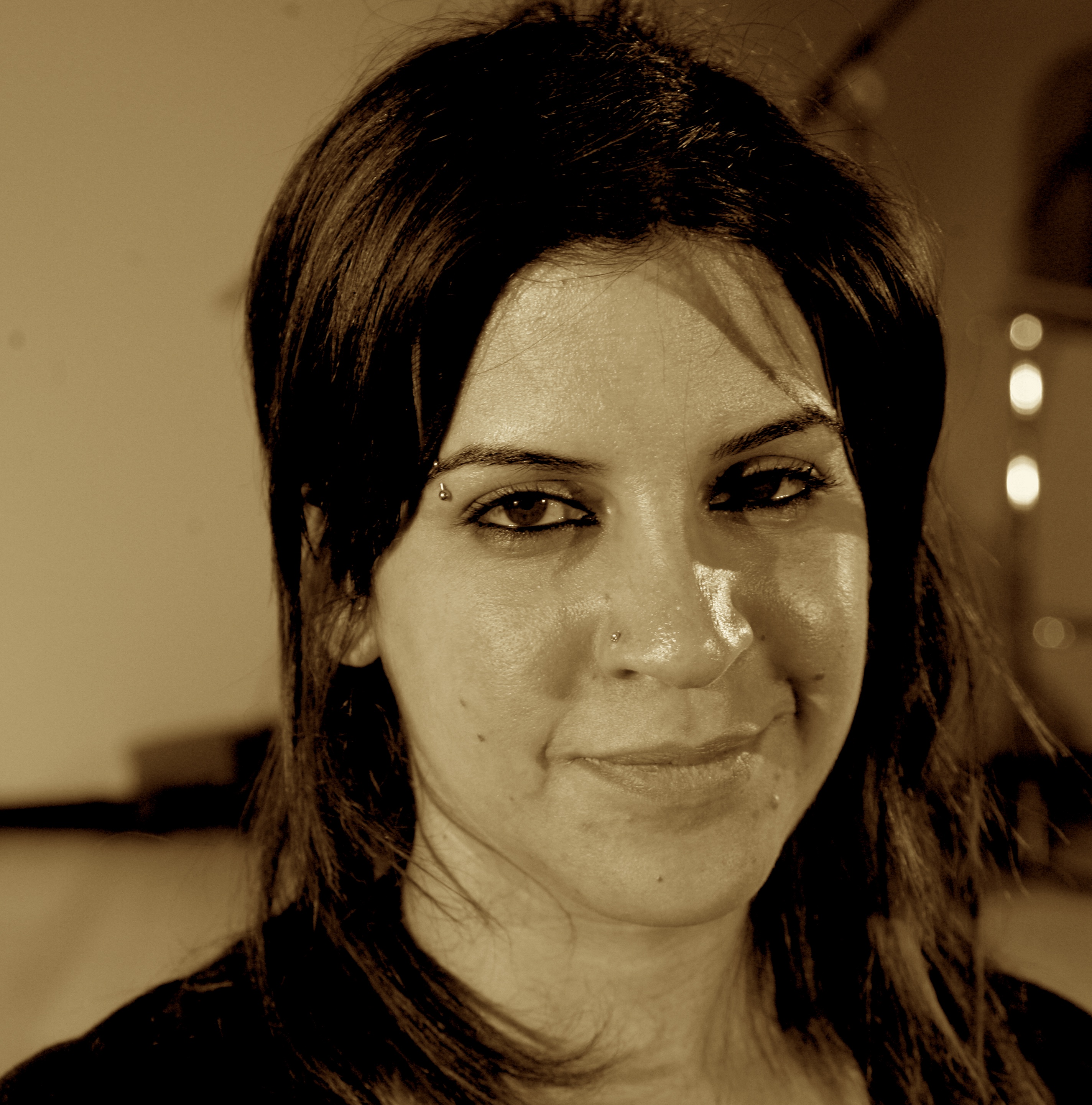In Bukavu, a woman protests in the streets against the authorities; the police shoot and…

Writing as a Revolution. Conversation with Lina Ben Mhenni, Dead at 36
Lina Ben Mhenni has died. A symbol of the revolution in Tunisia.
The blogger, who was one of the protagonists of the movement that led to the fall of President Ben Ali and a Nobel Peace Prize nominee, died at the age of 36 from a devastating illness.
Daughter of Sadok Ben Mhenni, a Marxist activist imprisoned by Bourghiba, Lina posted blogs reporting the Jasmine Revolution which she called the “Dignity Revolution”.
She criticized corruption and the fundamentalists of the Islamic party Ennahda, and denounced the torture at the hands of the regime against its own people.
Lina dreamed of a democratic and modern Tunisia, a place where youths could feel safe and have a future.
She saw her dream come true only in part. There’s still a long way to go. And she knew it. This is why she never left Tunisia to get better medical care. “My country needs me,” she said to the people who told her she could get more effective treatment elsewhere.
That’s also why she didn’t make it.
She leaves those who knew her with an enormous gap that cannot be filled.
For those that did not know her, there is no better reading than what follows, written by Marco Cesario.
Read it and you will understand the true greatness of this great woman.
Antonella Napoli
“Writing is a revolution that has changed the history of humanity. I can’t imagine my life without letters, words, sentences, without paragraphs, without lyrics and without books. Writing is my life and my revolution.”
These words, spoken in Lina Ben Mhenn’s serious and broken voice, echoed in the four white walls that surrounded our bodies with their insular luminescence as we sat on wicker chairs with shimmering glasses strewn on a white wrought iron coffee table, permeated by the reflection of the sea in the distance.
I had already met with her in Turin and Paris. This time she was staying on the Island of Ischia to receive the Ischia International Journalism Award. We were on the cliffs of Pithecusae, the most ancient Greek colony in Italy, the island colonized by Eretria and Chalcis who, as Strabone narrates in Geografia, abandoned it because they were terrified by the earthquakes and volcanic eruptions, by the menacing sea that boiled with hot water like the springs at the luxurious bay of Sorgeto. I felt as though I had found a match for the sulfurous activity of the island. I was sitting with an incredible woman whose writing had broken the old chains of patriarchal politics and overturned the balance of power in an entire country.
Lina Ben Mhenni is a petite woman, dark-haired, with lively eyes. Her blog, A Tunsian Girl, censured by the Ben Ali regime, continues to be a point of reference for civil struggles throughout Tunisia.
“Thanks to writing, I was able to express myself and help uncover the problems that plague my country,” she told me as a light green lizard shot machinelike up the white wall of the balcony and hid in the geraniums. In fact, thinking back on the events that shook the Arab world, the social movements supported by social networks stand out as irreplaceable elements in the important political changes that have taken place in recent years in countries seeking more democracy.
In addition to Dégage! (Get out!), that became the slogan of the Arab Spring because it was simple, effective and used by the people to cry out against illegitimate and obsolete regimes, social networks offered a platform, that can no longer be replaced, for the proliferation of activism that created transversal consensus within societies already in crisis.
“When it was impossible to express yourself in any other way under the dictatorship,” Lina said as if confirming my own thoughts, “digital media, a revolution in writing, allowed me to present my ideas to the public, my opinions. Writing gave me the possibility of giving a voice to those who don’t have a voice, to expose the social, economic and political issues that were shaking my country.”
I noticed the piercing on Lina’s right eyebrow. Her eyes, hazel, moved ever so slightly but the described an imaginary arc to the eye of the interlocutor, as if understanding the level of attention and at the same time sanction the significance of the topics covered.
“I was born into a politically active family. Thanks to my parents, I developed a political conscience. I read and wrote a lot. I discovered blogging by chance and decided to share my political thoughts with a specific audience. Little by little, I started meeting other bloggers and Internauts, and when they began to organize campaigns to defend human rights and freedom of expression, I participated. I started to learn how to use the Internet to change the situation in my country. It’s thanks to Internaut activism, activists and bloggers that we were able to obtain a new constitution, even though it’s only theoretical and is only valid on paper. In actual fact, nothing has changed for Tunisians and marginalized youth. Nothing has improved in terms of equality between men and women. Paradoxical as it sounds, most of the goals we fought for have not yet been achieved.”
The weight carried by bloggers and activists like Lina Ben Mhenni on political decisions is indisputable. Digital media made regimes falter and it shifted the power towards movements supported by social networks that began to seriously question political establishments as well as the conventional forms of democracy. It started shifting public opinion towards participatory democracy.
Another important element was the participation of women, previously been excluded from the political arena. But this didn’t last very long. In fact it only lasted for the brief period of the popular uprising when the spotlight of the western media was focused on the Jasmine Revolution. With the return of post-revolution religious extremism, the situation became very complicated. Lina’s daily life is proof of this.
“Since the day Ben Ali was deposed,” she told me, “my life is tormented, full of controversies and contradictions. Some people appreciate your efforts and support you but there are others who attack you, disparage you and try to silence you in any way. Today, being a woman activist in Tunisia means exposing yourself to constant risks and scorn by parts of society. Sometimes it means actually risking your own life. I have had police protection for over a year because I receive death threats. But I try to live a normal life, despite everything. At the beginning I couldn’t understand why I was receiving threats of death and unprovoked violence against me. I was too sad and unhappy. Perhaps I was also a little naïve. Today I continue to do what I do without worrying about those who undermine and threaten me. The Minister of the Interior and the Tunisian government decided that my life was in danger so they gave me an escort. It is very cumbersome. You lose a part of your independence, a part of your private life. I can’t move around freely like I did before. And in the end, the escort didn’t protect me from violence because I was beaten by police even though I was under police escort.”
This is the paradox of an activist and militant who was crushed by the weight of her own words and by a police escort that is more cumbersome than useful. However, the revolutionary blogger, despite the obstacles she faced, also generated a change in the perception of power from a political point of view. Traditional parties and representative bodies no longer had to deal with masses of already formatted and structured party politics, militants, or old-school associations, but rather, they had more “liquid”– as Zygmunt Bauman would put it – trends and movements that became more difficult to identify (but often even more ephemeral). The diversified blogosphere in Tunisia depicted a country where Ben Ali’s regime had almost complete control over traditional media outlets and space for dissent was extremely limited. In this militant country, bloggers, activists and netizens were able to carve out a space to effectively express their personal dissent. One need only think about Nawaat.org, that received the Reporters Without Borders Netizen Award in 2011, and the cyber-dissident site, Takriz that became an e-mag and was suspended in 2002, and Tunezine, founded in 2001 by activist Zouhayer Yahoui who later became an icon in cyber-militancy. So I asked myself what the concrete impact of new media and social networks on the political changes in Tunisia was. As this thought was taking shape, I asked Lina about it.
“New media,” she said, “the Internet, blogs and social networks, have played a very important role in the changes that took place in my country and other countries around the world. Thanks to these tools, we were able to mobilize young people and provide information on the reality of our countries. Traditional media was manipulated and exploited by the governments. Through these platforms, we were at least able to counterbalance the propaganda promoted by dictatorial regimes in various parts of the world.”
However, there is a new danger today. Turkey and other countries come to mind. Censoring the Internet and overall strict control of new media and social networks in order to nip dissent in the bud.
“Unfortunately,” Lina continues, “authoritarian regimes quickly understood the power of these tools and they are trying to gag Internauts. We saw what happened with Twitter, YouTube and social networks in Turkey. That’s why a new form of international battle is important, online, to oppose these new forms of censorship. At the moment, in Turkey there are reactionary attempts to impose control and filters on the Internet. Our battle continues on blog and social network turf through campaigns and, generally speaking, by putting pressure on national and international public opinion.”
A woman and her child walked passed us and began to admire the landscape below. She picked up her child and whispered something in his ear as they looked at the view. The child pointed to something on the horizon. Maybe it was a house by the sea or a boat. Did the situation is Tunisia improve after the revolution? Was there more freedom after?
“The situation in Tunisia,” Lina said, “is very complicated. Many people believe the revolution was a success. At the beginning, the only positive thing I could see was, in fact, gaining more freedom of the press and in general more freedom of expression. Unfortunately, after the initial months of enthusiasm, when we watched as new media, new newspapers and new television stations were founded, we realized that the new media that arose from the revolutionary ferment wasn’t working for the good of the Tunisian people anymore. Previously, the media was manipulated and controlled directly by the Ben Ali regime. Today businessmen and politicians are exploiting it for their own purposes. Today, as a Tunisian, I don’t feel represented by any news source nor do I see any media outlet able to present and broadcast the concerns of the Tunisian population.”
I watched as Lina looked out in the horizon at a rocky inlet covered in greenery through which a liquid glimpse of the sea opened up.
“Unfortunately, I didn’t get a chance to visit Ischia as I would have liked to.” She said with a touch of sadness. “I spent the entire time between interviews and television stations. Nevertheless, since my arrival on the island, I have had very strong feelings that sent shivers through me. My parents,” she said gazing out at the sea in the distance, “come from an island, so I have a special place in my heart for islands and I couldn’t help compare Ischia to Djerba. I hope all Tunisians see Ischia so they will see how they can preserve the islands we have.”
Then she became serious and said, “Today my parent’s island is in a frightful state. There is a huge garbage problem that is threatening inhabitants and tourists. How I wish the people of Djerba could learn from you Italians and work to preserve the nature of the island. The nature in Ischia is so beautiful and I’ll never forget the landscape where the lush green forest and the beautiful clear blue sea cross. People here are so nice and welcoming. I’ll never forget my stay on Ischia.”
Lina smiled at me, hugged me and walked away into the sunset. I stood alone looking over the island that now seemed immersed in a golden sea enshrined by the sunset that shone over the world and over all things. I looked out at the sea, at Mount Epomeo, as the promontory was lapped by the shores of Sant’Angelo. It was so beautiful.
* the interview is an excerpt from, Medin. Trenta storie del Mediterraneo (Rogiosi Editore, 2015)





